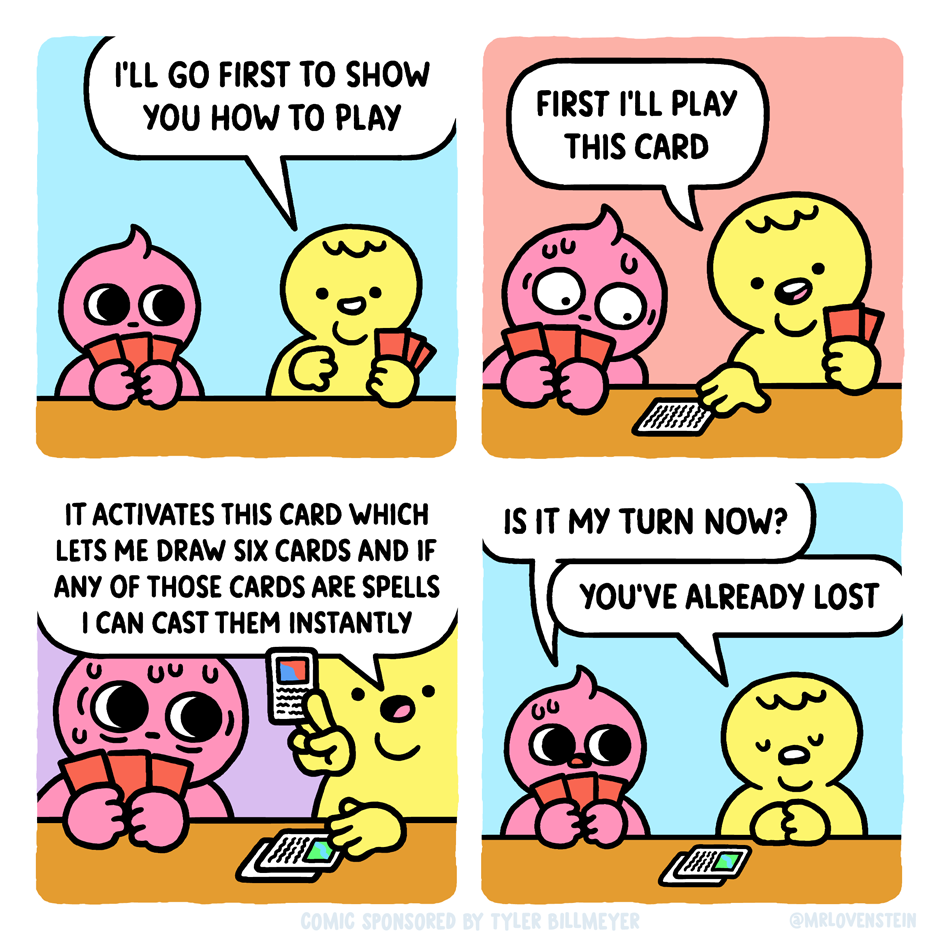this post was submitted on 03 Feb 2024
1013 points (98.8% liked)
Comic Strips
13799 readers
2904 users here now
Comic Strips is a community for those who love comic stories.
The rules are simple:
- The post can be a single image, an image gallery, or a link to a specific comic hosted on another site (the author's website, for instance).
- The comic must be a complete story.
- If it is an external link, it must be to a specific story, not to the root of the site.
- You may post comics from others or your own.
- If you are posting a comic of your own, a maximum of one per week is allowed (I know, your comics are great, but this rule helps avoid spam).
- The comic can be in any language, but if it's not in English, OP must include an English translation in the post's 'body' field (note: you don't need to select a specific language when posting a comic).
- Politeness.
- Adult content is not allowed. This community aims to be fun for people of all ages.
Web of links
- [email protected]: "I use Arch btw"
- [email protected]: memes (you don't say!)
founded 2 years ago
MODERATORS
you are viewing a single comment's thread
view the rest of the comments
view the rest of the comments

I did mention TTRPGs, but my main example was the SJG card game Illuminati, which was basically the same gameplay when it was turned into a TCG, it just expanded the deck in a way that required you to keep spending money if you wanted a remotely even playing field. Before it was a TCG, it (and the similar SJG game Hacker) were in regular gameplay rotation in my social circle. The gameplay of card games is fine. I have no issue there. And if, say, MTG had a standard deck everyone played from, I might even play it. It's the 'keep buying more' thing which I just can't justify spending my money on.
As far as finding a group to play with, I've always gamed with at least one or two people in the group I already knew, so I guess that's not an issue I've personally had to face, but I can see why that could be an issue.
If everybody played from the same deck, it would be a different game. They could sell it in non-randomized boxes instead, though. It would still be expensive, just much, much less expensive.
For example, the modern version of Netrunner is like this. Each player still builds their own decks, but the cards aren't blind buys. Every box of cards has the exact same cards.
But that's sort of built into the game, isn't it? The idea that the playability depends on continued purchases. But you can have similar games with similar playability that you spend $30 on or whatever and they might have expansion sets for it, but it's not all based on either spending a small amount of money and having good luck or spending a large amount of money.
Think about arguing that loot boxes were necessary for a video game. That might be true for that game, but it's because the game was designed around buying loot boxes. And there are probably games which have at least relatively similar gameplay but don't have the loot box thing. And maybe you're okay with paying for those loot boxes. They wouldn't have loot boxes in games if people weren't willing to pay for them. That's fine if that's what you want to spend your money on, but it is not something I can personally justify with my own money.
No, I don't think it is, and the reason why is because nothing in the gameplay necessitates random purchases. That isn't part of the game. In fact, several CCGs have gone from a blind-buy model to a fixed-distribution model and the gameplay has not changed at all. They did this with Netrunner, Call of Cthulhu, and some others. Fantasy Flight has a whole line of these called "Living Card Games".
It's easy to imagine Magic being sold in a similar way: instead of randomized boosters, you buy boxes of cards that contain 4 of each card, you build your decks, and off you go.
At the highest levels of play, money isn't a factor. The players who win Magic tournaments aren't the ones with the most money. If that were true, it would obviously be a broken game, and nobody would be playing it anymore. Instead, wealth is a gatekeeper. You have to have a certain amount of expendable wealth to be able to play at the highest levels. If you made all of the cards equally accessible, it would change nothing except lowering the bar to entry.